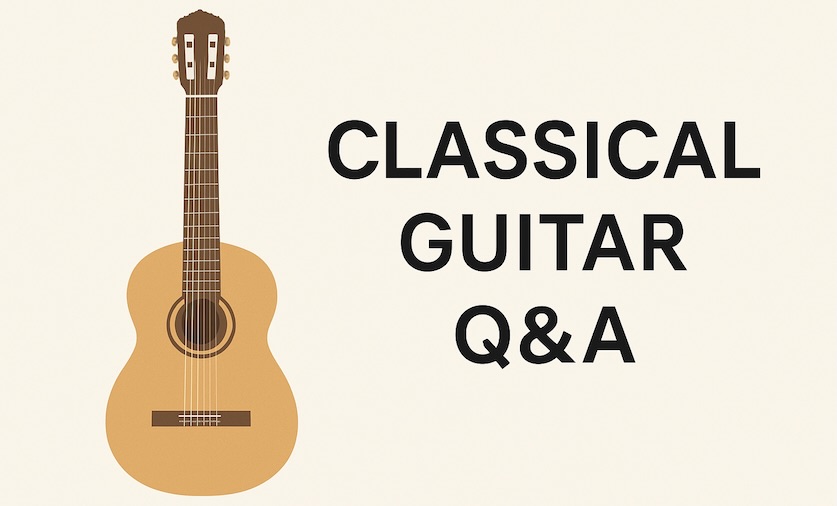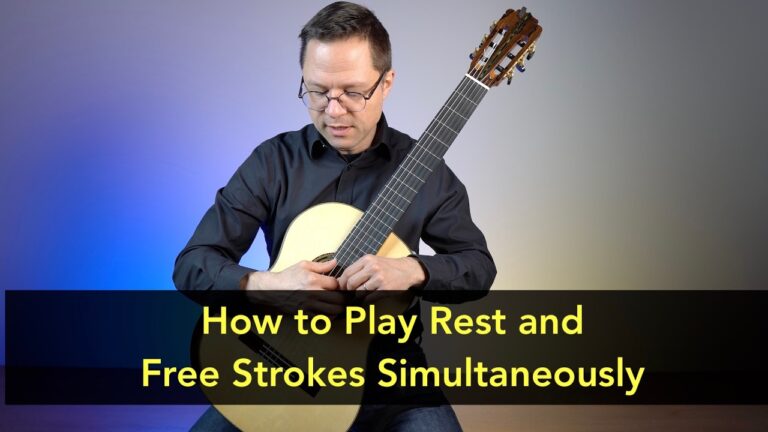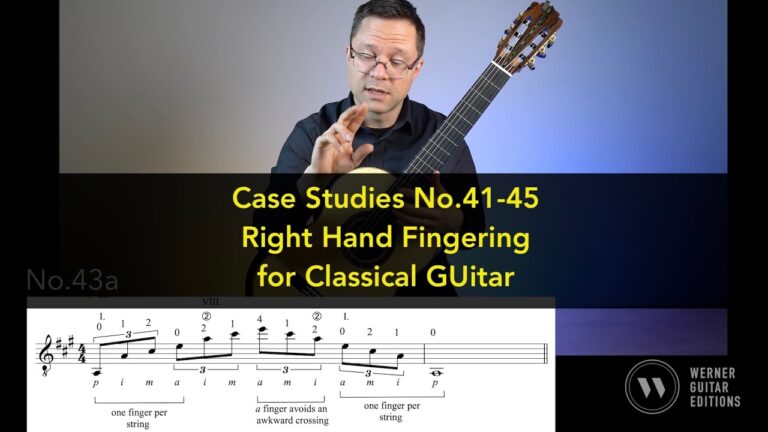
Question: How can I deal with performance anxiety in music and guitar?
Before I give you practical tips and step by step approaches, let’s first look at some misconceptions about performance anxiety. People can often perform a piece well at home but in front of an audience during their first performance they freeze up mentally or physically, their hands shake, it’s all jittery etc. So let’s first look at what you’re actually seeing in a good performance.
When you see a good performance (ideal preparation)
Let’s examine the dedicated music student in a conservatory or university for context on an ideal development of a performance. Students who perform well might have worked on that piece for a whole year, or two years, or more. They have likely performed the piece every week for their teacher, possibly 26 times or more. They might have played in masterclass every week, so another 20 sessions. They have played it for friends, family, and smaller concerts. So by the time you see them perform it well in a concert they could have played it 50-80 times for people already (whether fragmented or not).
They’ve had success and failure and worked through it, and they just kept doing it. The same piece over and over for months or years. They learned about how much they shake, what tempo is actually needed to play it well, what techniques helped (right hand planting?) and which didn’t (fast tempos and light risky touch?).
Therefore, the student gets practice at performing and discovers regularly how it feels to make adjustments in order to have a successful performance. They learn to play in a way suited to a performance, not the ideal way they imagined at home. It is performance-framed and set by the reality of their actual performing skills.
What about us normal people?
Not everyone can have all the performance opportunities I discussed above but the advice remains the same. Play for people as much as possible way before any concert. Do this without worries about how well it will go. You can ask people to listen to you and tell them that you are trying to work through some performance anxiety. Don’t apologize for it, don’t say it went better at home, just let them know and then play. Maybe you can play it for them at two different tempos to compare the results. Keep doing the same piece over and over so you can learn how your body reacts.
Q&A Video on Performance Anxiety
Acknowledge that performance nerves exist
Don’t try to hide behind your performance nerves or cover them up. They exist, and that is ok. Performance anxiety affects all performers to some extent and is a very common challenge. So acknowledge that you have it. Don’t apologize to the audience or yourself, just accept it. Then, remember to remind yourself about how you love music and want to share it with others and are willing to work on it. The best things in life do sometimes take work.
Do what’s best for the music (public vs private you)
As a performer there will be a Public You and Private You. The Public You does whatever is best for the music at any given time. Actually, the Private You should do this too but it’s even more true in performance. So if that means that Public You needs to play your piece at a slower tempo to make it a better performance, then Public You plays it slower. Stop saying, “it went better at home”. Public You is the one who performs and you need to discover what that means for your body and the music.
If you practice the same way every time you could be hurting your performance flexibility. The way you feel on stage might be different than the practice room so you need to be flexible to making changes on the spot while performing. You need to adapt to the situation. Of course, you also need to perform often to discover what Public You needs to adjust in the elements of the music for the situation.
This is largely a discussion on your vision of an ideal performance or a practical performance. But don’t confuse practical performance with an unmusical one. It’s simply a matter of making choices about how to present the music based on the reality of the situation. If you need to play slower it is simply an opportunity to play with better legato and phrasing.
Practical Tips to Help Performance Anxiety
Play for people as often as possible – As discussed, the more you play for others the more you will understand how the Public You needs to respond to the situation. Play the same piece for people over and over. If you let them know you are working on performance anxiety they will be happy listen to you play it more than a few times.
Take lessons with a teacher – A teacher can help make certain choices for you to speed up the process of defining the Public You and what musical elements need to be adjusted to make a beautiful and musical performance in the context of your unique performance anxiety.
Choose a performance tempo (practice at different tempos) – Practice your music at a variety of tempos so you aren’t thrown off guard by needing to change the tempo. You can replace tempo with other musical elements. Maybe a slightly slower tempo will allow an absolutely beautiful legato phrasing.
Work on right and left hand planting and contact – If your finger is on the string in the right place before it has to play, you will have a higher level of accuracy and shaking hands won’t be as much of an issue. I once read that the great David Russell will even finger his music specifically to have fingers down more often to help with this. Lessons: Right Hand Planting & Preparation and also Left Hand Preparation.
Focus on the music – Don’t focus on yourself or what people might be thinking. Both you and your listener are here for the music so stay connected to what you are playing and enjoy listening to it as you play.
Focus on sustain and sound – One of the first things to go in a nervous performance is sustain and sound quality. In our frantic attempt to play the music we keep letting go of notes and jittering toward the next. Even more freaky is the silence between notes when there shouldn’t be, it makes us even more jittery. Stop that. Enjoy sustain more than ever during a performance. It will make you feel more comfortable hearing a beautiful sustaining note. It will fill the space with comforting sound that you play over.
Build relaxation into your pieces just like the muscle memory of playing the notes – Take your time at the ends of phrases and before difficult shifts. You can practice doing this at home. Sustain the note before a difficult shift and then calmly do the shift as if it was easy. This might have a better musical result in performance compared to frantically leaping up. I’ve taught people to relax shoulder tension at the end of each phrase and I’ve notice them subconsciously doing it in performance because it has become a learned habit in their muscle memory. Build in relaxation and decaffeinate the experience.
Pre-Concert Relaxation – Some people like to do some deep breathing and meditation before a concert, if that helps you, great. I like to practice a set technique routine and incorporate breathing during that. I find playing easy technique to be a meditative experience in its own right. Just nice calm motions on something I know well.
Have a easy technique routine of around 5 mins – If the situation allows, having and easy technique routine of about 5 minutes long is great for pre-performance preparation. If you only have 5 mins, great. If you have 10 mins you can repeat it twice. Make it easy and memorize it so you have something to do besides sit there getting nervous. Don’t play your piece, it’s not going to get better just before the concert and if you made a mistake it might freak you out. Play your easy routine and feel confident before a performance.
Remind yourself why you are performing – You love music, you want to share it and take part, remind yourself of that. You can actually say to yourself, “I want to do this.” To hear yourself say that is actually very comforting and reminds you to focus on the positive vibe that should exist.
Treat yourself in the same way you would treat a child or friend
What would you say to a child or friend who was nervous to perform? What would you say to them after their performance if it didn’t go as planned? Unless you are a total jerk, you probably were super positive and supportive. You also likely told them that the few mistakes they made were not a big deal at all. Why would you not be this kind to yourself? Why would you not be nurturing a positive and supportive vibe within your own studies? Be kind, share music, make mistakes, learn about yourself.
Questions & Support
If you need clarification on this particular Q&A please leave a comment below. For new and existing questions please visit the main Classical Guitar Q&A page. If you are enjoying the free Q&As you can support the site here.





Great article! What do you think of video recording as a way to simulate/stimulate performance anxiety?
Yes! Great idea, even the camera makes me feel some nerves and change a few elements. Anything you can do to experiment is a good idea.
Interestingly, I showed part of the article to my spouse, and she didn’t get it at first. She plays classical violin and jazz bass, so she’s with other musicians much of the time (alone practice is just for things like technical exercises or learning a new part). I had to explain how different it is for those of us on solo polyphonic instruments like piano or classical guitar, where we learn and practice our pieces mostly in a room alone until we’re suddenly thrown in front of an audience.
True, chamber music relieves some of the anxiety for sure. Guitar specifically though is involved in these tiny precise movements which are particularly prone to error if any jitters or shakes come into the equation.